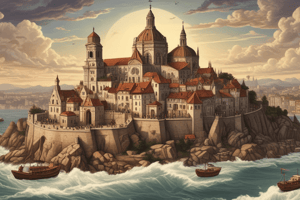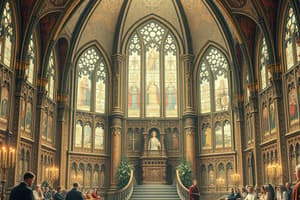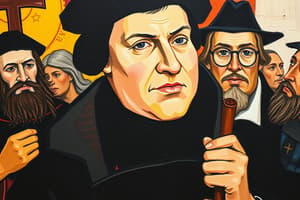Podcast
Questions and Answers
List the effects of the Protestant Reformation.
List the effects of the Protestant Reformation.
Christianity divides, religious conflicts, rise of nation-states, Counter Reformation.
Who is considered the face of the Protestant Reformation?
Who is considered the face of the Protestant Reformation?
Martin Luther
What is predestination in Calvinism?
What is predestination in Calvinism?
The elect are chosen by God; an individual's actions do not determine election.
What led to the English Reformation?
What led to the English Reformation?
What was the Peace of Augsburg?
What was the Peace of Augsburg?
Who were the Huguenots?
Who were the Huguenots?
What did the Edict of Nantes accomplish?
What did the Edict of Nantes accomplish?
How did the Protestant Reformation allow secular leaders to centralize their power?
How did the Protestant Reformation allow secular leaders to centralize their power?
What is the Lutheran path to salvation?
What is the Lutheran path to salvation?
What is the Catholic Church's path to salvation?
What is the Catholic Church's path to salvation?
What is the Index of Forbidden Books?
What is the Index of Forbidden Books?
What was the Inquisition?
What was the Inquisition?
What was the Counter Reformation?
What was the Counter Reformation?
Who were the Jesuits?
Who were the Jesuits?
Flashcards are hidden until you start studying
Study Notes
Effects of the Protestant Reformation
- Christianity divided into various sects and denominations, altering the religious landscape.
- Resulted in significant religious conflicts across Europe.
- Contributed to the rise of nation-states, where rulers could assert authority over religious matters.
- Led to the Counter Reformation, a response from the Catholic Church to regain influence.
Protestant
- Defined as members of Christian churches founded on Reformation principles.
- Advocated personal interpretation of the Bible without Church intervention.
- Martin Luther played a pivotal role by posting his 95 Theses and translating the Bible into German.
John Calvin
- French theologian (1509-1564) who shaped Calvinism.
- Introduced the concept of predestination where only the "elect" are chosen by God.
- Believed in theocracy, where church authority impacts government decisions.
- Disagreed with Catholic teaching on salvation through good works.
English Reformation
- Initiated by Henry VIII's desire for an annulment due to lack of male heirs.
- The Pope's refusal led Henry to break from Catholicism and establish the Church of England (Anglican).
- The new church still limited religious freedoms.
Peace of Augsburg
- Established in 1555, allowing rulers of German states to determine their state religion.
Huguenot
- Refers to French Protestants who faced persecution and conflict, particularly during the Thirty Years War.
Edict of Nantes
- Issued in 1598, granted Huguenots religious freedom in France.
- Aimed to end the French Wars of Religion, but eventually contributed to rising tensions leading to the Thirty Years War.
- Created by Henry IV, who, though a Huguenot, converted to Catholicism.
Centralization of Secular Power
- Secular leaders gained power by supporting the Reformation, diminishing the Pope's influence.
- Example figures include Henry VIII and various German princes like Prince of Saxony.
Lutheran Path to Salvation
- Emphasized two sacraments: Baptism and Communion.
- Salvation achieved through justification by faith alone.
- The Bible is regarded as the ultimate source of truth, allowing individual interpretations.
Catholic Church's Path to Salvation
- Relied on indulgences and the necessity of clergy for salvation.
- Included seven sacraments (such as Baptism and Last Rites) as essential rites.
- Truth derived from both the Bible and Church traditions.
Index of Forbidden Books
- Compiled by Pope Paul IV during the Counter Reformation to prohibit certain literature deemed harmful to faith.
- Illustrated the impact of the printing press on spreading Reformation ideas.
Inquisition
- A tribunal used by the Roman Catholic Church to address heresy.
- Often involved severe interrogation methods and torture to extract confessions.
Counter Reformation
- The Catholic Church's movement to counteract the Reformation's effects.
- Aims included reaffirming church doctrine and combating heresy through initiatives like the Inquisition and the Index of Forbidden Books.
Jesuits
- Known as the Society of Jesus, founded by Ignatius Loyola.
- Functioned as a missionary and educational order aimed at resisting Protestantism and promoting Catholic teachings.
Studying That Suits You
Use AI to generate personalized quizzes and flashcards to suit your learning preferences.




